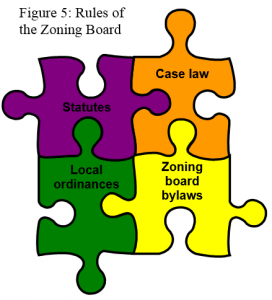Laws that Apply to Zoning
Zoning boards must look to several sources for guidance on proper procedures including: 1) state statutes, 2) local ordinances, 3) zoning board bylaws or operating rules, and 4) case law.
 State statutes outline the authority of zoning boards and describe many procedural and ethical guidelines that zoning boards and other local government bodies must follow, such as the open meetings laws, public records law and state ethics code.
State statutes outline the authority of zoning boards and describe many procedural and ethical guidelines that zoning boards and other local government bodies must follow, such as the open meetings laws, public records law and state ethics code.
Local ordinances further define the authority and procedures to be followed by zoning boards. In addition, local ordinances provide specific details about the purpose and intent of zoning codes and criteria for making zoning decisions.
Day-to-day operational procedures of the zoning board that are not covered in state statutes or local ordinances should be addressed in zoning board bylaws or rules of procedure. This set of procedures should be created locally by the governing body with input from the zoning board and staff.
Many procedural and decision standards applicable to zoning boards are derived from case law. Wisconsin Supreme Court decisions and published decisions of the courts of appeals become legal precedent and are referred to as case law.
Resources
Open Meeting Laws, Zoning Board Handbook, Chapter 5.
Ethical and Procedural Considerations, Zoning Board Handbook, Chapter 6.
Adoption of Operating Rules, Zoning Board Handbook, Chapter 7.
Legal Resources, Zoning Board Handbook, Appendix B.




